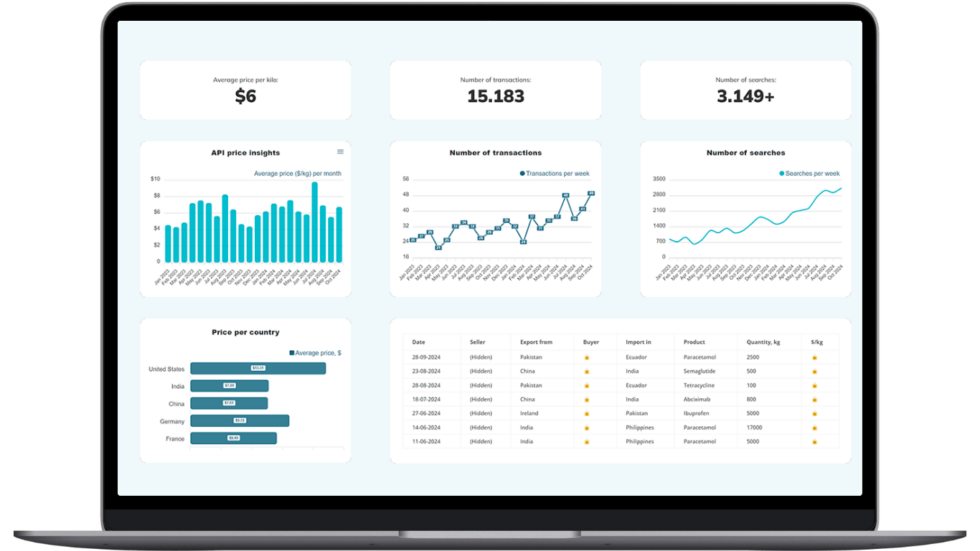The Power of Big Data in the Pharmaceutical Industry
Insights by Pharmaoffer

David Blok | Posted on May 30, 2023
In the digital age, pharma organizations are accumulating vast amounts of data that can revolutionize patient care, research, and decision-making. Big Data analytics offers unparalleled opportunities for improving healthcare outcomes, enhancing efficiency, and driving innovation. However, along with the immense potential, there are challenges to overcome.
This article explores the role of Big Data in healthcare, highlighting the opportunities it presents and discussing the challenges that need to be addressed.
What are the benefits of big data in the pharmaceutical industry?
1. Improved Clinical Decision-making: Big Data analytics enables healthcare providers to extract valuable insights from large datasets, leading to more informed and evidence-based clinical decision-making. By analyzing vast amounts of patient data, including medical records, lab results, and genomic information, healthcare professionals can identify patterns, predict outcomes, and personalize treatment plans.
2. Early Disease Detection and Prevention: Leveraging Big Data analytics can enhance disease surveillance and early detection. By monitoring real-time data from various sources, such as electronic health records, wearable devices, and social media, healthcare systems can identify disease outbreaks, track health trends, and implement proactive preventive measures.
3. Precision Medicine and Personalized Care: Big Data analytics facilitates the advancement of precision medicine by integrating genomic data, patient characteristics, and treatment outcomes. This approach enables the tailoring of medical interventions to individual patients, optimizing treatment efficacy and reducing adverse events.
4. Health Resource Optimization: Efficient allocation of healthcare resources is crucial. Big Data analytics can provide insights into resource utilization, patient flow, and healthcare system performance. By analyzing data on patient demographics, disease prevalence, and healthcare utilization, organizations can optimize resource allocation, streamline operations, and improve patient access and satisfaction.
Challenges in utilizing big data in pharma
1. Data Quality and Integration: Ensuring data quality and interoperability remains a significant challenge in healthcare. Datasets are often fragmented, residing in different systems and formats. Data integration, standardization, and data cleansing processes are necessary to derive meaningful insights. Addressing these challenges requires robust data governance frameworks and interoperability standards.
2. Privacy and Security Concerns: Healthcare data contains sensitive patient information, making privacy and security a top concern. Protecting patient confidentiality, complying with regulations like HIPAA, and implementing robust security measures are essential. Striking a balance between data access for research and analytics while safeguarding patient privacy requires stringent data governance protocols.
3. Regulatory and Ethical Considerations: Healthcare data is subject to strict regulations and ethical considerations. Ensuring compliance with data protection laws, research ethics, and informed consent requirements is critical. Developing frameworks for data anonymization, de-identification, and ensuring responsible data usage is necessary to navigate these complexities.
4. Data Governance and Ownership: Defining data governance structures and clarifying data ownership rights can be challenging. Healthcare organizations must establish policies, procedures, and frameworks for data collection, storage, access, and sharing. Collaborative efforts between stakeholders, including healthcare providers, researchers, and patients, are needed to develop transparent governance frameworks.
5. Data Analytics Skills Gap: The rapid advancement of data analytics technologies has created a skills gap in the healthcare industry. Healthcare professionals need training and support to develop proficiency in data analytics, data interpretation, and the application of insights to patient care. Investing in educational programs and providing resources for healthcare professionals can bridge this gap.
How to overcoming the challenges?
1. Collaboration and Partnerships: Collaboration among healthcare organizations, technology providers, researchers, and regulatory bodies is crucial for addressing the challenges associated with Big Data in healthcare. Building interdisciplinary partnerships fosters knowledge sharing, aligns efforts, and enables the development of standardized frameworks and best practices.
2. Data Governance and Ethics Frameworks: Establishing robust data governance frameworks that incorporate privacy, security, and ethical considerations is imperative. Organizations should proactively implement policies and procedures for data collection, storage, access, and sharing, ensuring compliance with regulatory requirements and ethical standards.
3. Investment in Infrastructure and Technology: Healthcare organizations need to invest in robust IT infrastructure and technologies capable of handling and analyzing large-scale datasets. Cloud computing, artificial intelligence, and machine learning tools empower efficient data processing, analysis, and visualization, enabling valuable insights to be extracted from Big Data.
4. Education and Training Initiatives: To bridge the skills gap in data analytics, healthcare organizations should prioritize educational and training programs. Offering courses, workshops, and certifications on data analytics and informatics equips healthcare professionals with the necessary skills to leverage Big Data effectively.
Conclusion
Big Data analytics presents unparalleled opportunities to transform healthcare, enhance patient outcomes, and drive innovation. By harnessing the power of large-scale datasets, healthcare organizations can make evidence-based decisions, advance precision medicine, and optimize resource allocation.
However, challenges such as data quality, privacy concerns, regulatory complexities, and the skills gap need to be addressed. By establishing robust data governance frameworks, prioritizing privacy and security, fostering collaboration, and investing in infrastructure and education, the healthcare industry can unlock the full potential of Big Data.
Overcoming these challenges will pave the way for a data-driven future, where patient care is optimized, diseases are detected early, and healthcare systems are efficient and sustainable.

Make Smarter API Decisions with Data
Access exclusive insights on global API pricing, export/import transactions, competitor activities and market intelligence.
FAQ
What is Big Data Analytics in the Pharmaceutical Industry?
Big Data Analytics in the pharmaceutical industry involves the collection and analysis of vast amounts of data to draw valuable insights. This data can range from patient medical records and lab results to genomic information and real-time health monitoring. Big Data analytics can revolutionize patient care, research, and decision-making in healthcare.
How Does Big Data Improve Clinical Decision-Making in Pharma?
Big Data analytics enable healthcare providers to extract insights from large datasets, leading to more informed and evidence-based clinical decision-making. By analyzing a variety of patient data such as medical records, lab results, and genomic information, healthcare professionals can identify patterns, predict outcomes, and personalize treatment plans for better patient care.
What Are the Privacy and Security Challenges of Using Big Data in Healthcare?
Privacy and security are significant concerns when it comes to Big Data in healthcare. Since healthcare data often contains sensitive patient information, complying with regulations like HIPAA is crucial. The challenge lies in finding the balance between making data accessible for research and analytics while also safeguarding patient confidentiality.
How Can Big Data Facilitate Early Disease Detection and Prevention?
Leveraging Big Data analytics can enhance disease surveillance and facilitate early detection of diseases. By monitoring real-time data from various sources such as electronic health records, wearable devices, and even social media, healthcare systems can identify disease outbreaks, track health trends, and implement proactive preventive measures.
What Steps Are Being Taken to Address the Data Analytics Skills Gap in Healthcare?
To bridge the skills gap in data analytics within the healthcare sector, organizations are investing in educational programs and providing resources for healthcare professionals. Offering courses, workshops, and certifications in data analytics and informatics equips healthcare staff with the necessary skills to leverage Big Data effectively.
Are There Regulatory and Ethical Frameworks for Big Data in Pharma?
Yes, healthcare data is subject to strict regulations and ethical considerations. Organizations are developing robust data governance frameworks that incorporate privacy, security, and ethical considerations. These frameworks guide data collection, storage, access, and sharing while ensuring compliance with existing laws and ethical standards.






Check out all other blogs here!